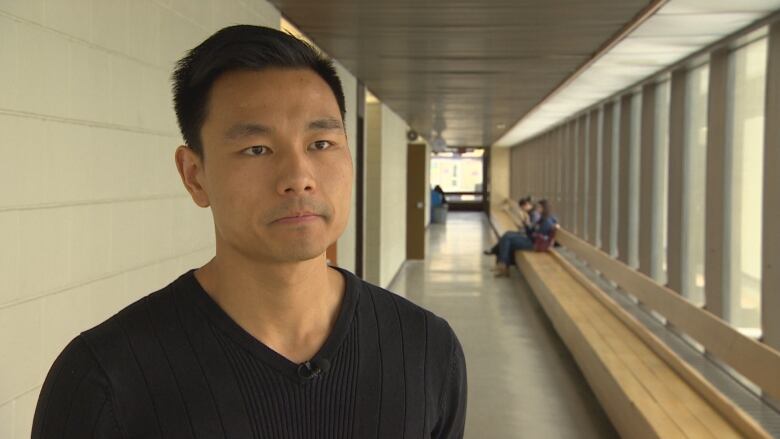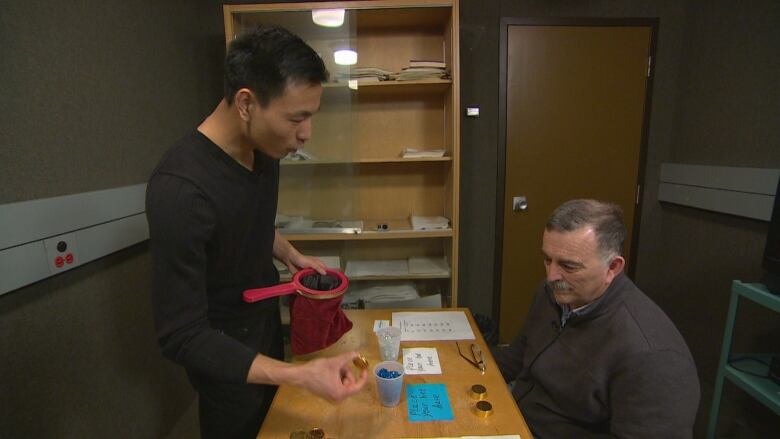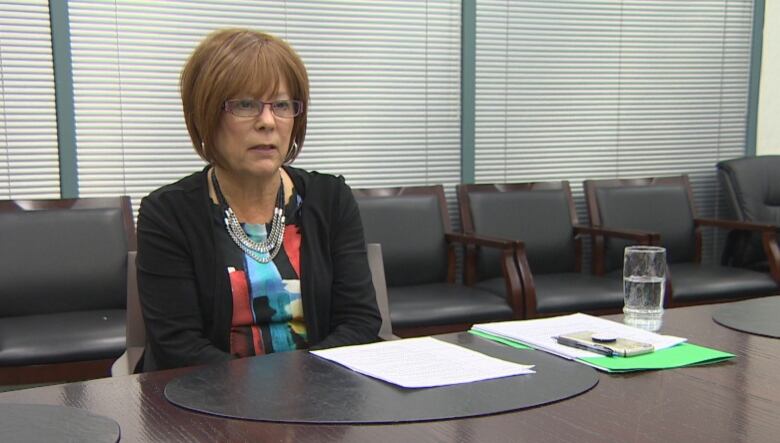Liquor & Lotteries quietly cuts $1M gambling research program
Crown corporation refocusing efforts on internal projects, says director of corporate responsibility

Long Zhou thought he knew everything there is to know about gambling, but that changed once he realized he was an addict.
"I lost about $100,000," said the 30-year-old honours student, who also works as a realtor in Brandon.
Zhou got his first taste of gambling as a child in China. His father was a regular at the local poker room and he tagged along.
"In China gambling is forbidden. It's illegal. So I moved to Canada and found that gambling is permitted. So hey, I want to give a try. Because I always enjoyed gambling," said Zhou.
That was six years ago and he has been addicted ever since.
"I don't want my life ruined over gambling so I decided to come to university and take psychology to get to know myself better," Zhou said.
Zhou wanted to do more than examine his own life. He wanted to contribute to the understanding of the psychology of gambling addicts.

Zhou knew grants were available for research. Before he self-excluded himself from McPhillips Station Casino, he volunteered to participate in a study tracking how high risk problem gamblers feel about themselves.
He went on to develop his own study into the effects of responsible gambling advertisements on people's behaviour. Last December, he asked Manitoba Liquor &Lotteries for an academic research grant under its Manitoba Gambling Research Program.
Zhou was declined because the program was quietly phased out as of the beginning of 2018.
Linda Taylor used to chair the research council that allocated up to $1 million in research grants per year for the Manitoba Gambling Research Program, which is paid out of Liquor & Lotteries' approximately $12-million annual social responsibility budget.
"I'm disappointed that the government should choose to phase it out. It doesn't make any sense to me," said Taylor. "It is really clear that there is a need to to be doing research which is accountable to the public and is transparent."

Taylor admits even before the program ended the budget was not entirely spent.
"The staff were being utilized in other ways by Liquor & Lotteries. There wasn't enough outreach, in my view, going on," said Taylor.
Manitoba Liquor & Lotteries defended its decision to terminate the gambling research program, saying it will spend the money in-house.
"We are refocusing our efforts on internal projects," said Bev Mehmel, director of corporate responsibility withLiquor & Lotteries.
"We fund addictions agencies," said Mehmel. "We really need to be doing more program evaluations to ensure that the programs that we're funding are meeting their goals and they're effective."
Mehmel said some of the money will be used for internal research to inform business decisions.

Taylor says if anything, gambling research in Manitoba needs to be more independent from Liquor & Lotteries.
She admits there were limitations on the scope of research when she was chair of the Manitoba Gambling Research Programbecause it was funded by Liquor & Lotteries.
"It was constrained by the overall priorities that had been set by Liquor & Lotteries."
Taylor points out curbing problem gambling could be at odds with the profit motive of the Crown corporation.
"Ifwe were wanting to do something that directly contradicted them, I think that wouldn't have been able to go through," she said.
The focus was often on the individual rather than on institutional ways in which gambling is promoted, she said.
Taylor thinks research funding should be transferred to a university or other independent body that holds no responsibility at all to Liquor & Lotteries.
"The gambling institutions throughout Canada have quite a lot of power and they have quite a lot of money and I think they can wield that power pretty effectively," said Taylor.
The independence of Zhou's study came by chance rather than by design.
He decided to pay for it himself and has been conducting tests for the last month in a small lab at Brandon University.
He hopes to complete the study by the end of April.
Got a tip for the CBC News I-Team? Emailiteam@cbc.caor call the confidential tip line at 204-788-3744.













_(720p).jpg)


 OFFICIAL HD MUSIC VIDEO.jpg)
.jpg)



























































































